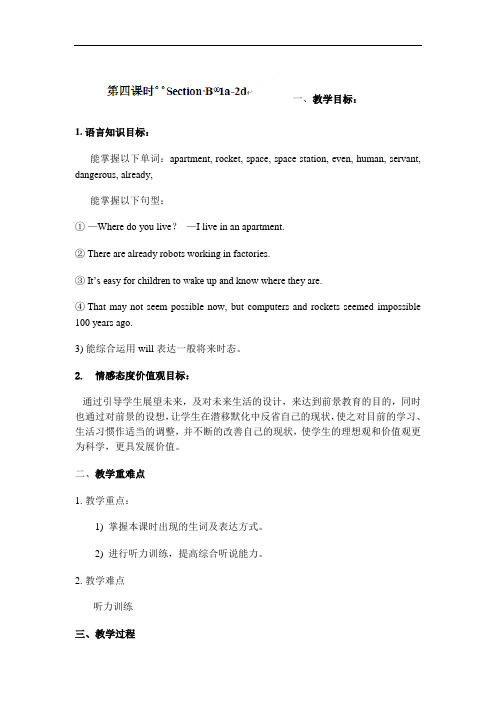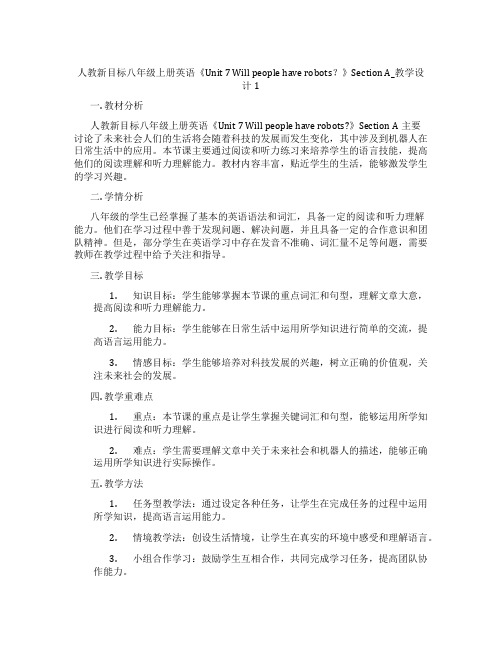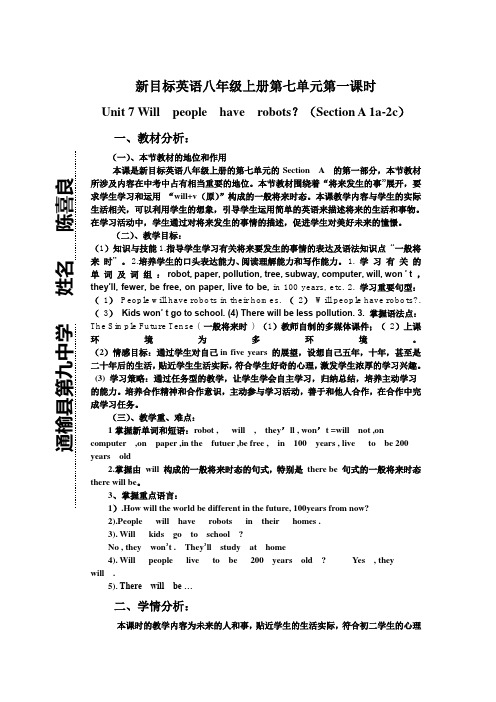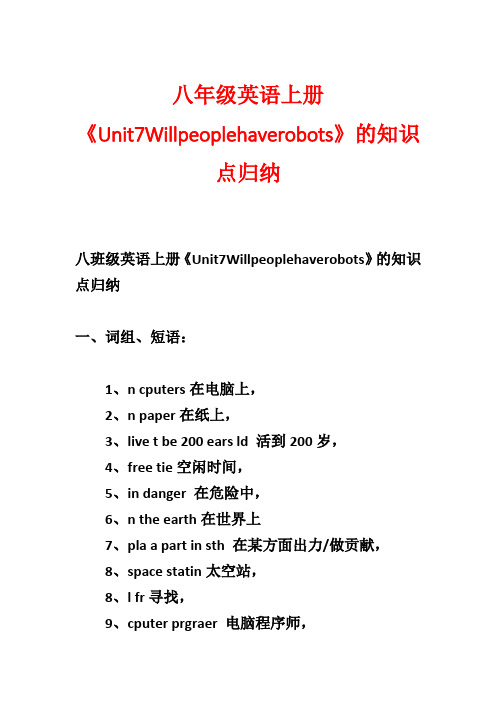新目标英语八年级上册Unit 7 Will people have robots精品PPT课件
新目标 八年级英语上册:Unit 7 Will people have rob

一、教学目标:1. 语言知识目标:能掌握以下单词:apartment, rocket, space, space station, even, human, servant, dangerous, already,能掌握以下句型:①—Where do you live?—I live in an apartment.② There are already robots working in factories.③It’s easy for children to wake up and know where they are.④ That may not seem possible now, but computers and rockets seemed impossible 100 years ago.3) 能综合运用will表达一般将来时态。
2. 情感态度价值观目标:通过引导学生展望未来,及对未来生活的设计,来达到前景教育的目的,同时也通过对前景的设想,让学生在潜移默化中反省自己的现状,使之对目前的学习、生活习惯作适当的调整,并不断的改善自己的现状,使学生的理想观和价值观更为科学,更具发展价值。
二、教学重难点1. 教学重点:1) 掌握本课时出现的生词及表达方式。
2) 进行听力训练,提高综合听说能力。
2. 教学难点听力训练三、教学过程Ⅰ. Warming- up and revision1. Daily greeting.2. 复习情态动词will 构成的一般将来时态的构成。
3. 复习more, fewer, less 后面所跟名词的情况。
4. 让学生们谈谈自己所画的未来城市的前景情况。
Ⅱ. Lead in1. Ask Ss some questions:T: What will do in the future?T: Where will you live?T: How will you go to work?Get some Ss think and answer the questions.2. Present some new words on the big screen. e.g.apartment, rocket, space, space station, human, servant, factor y…3. Explain some main words to the Ss . Give some examples on the big screen.simple, over and over again, believe, hundreds of, disagree, shape, fall, fall down, look for, possible, impossible even, dangerous, already4. Work on 1a. Write each word in the correct column below.Ⅲ. Discussion1. Work with your partners. Think of other words and write them in the chart in 1a.2. Let Ss discuss the words and write them in the chart.3. Let some Ss read the words.4, Work in groups. Tell your partner what you know about robots. What do they look like and what can they do?5,Ask some Ss describe the robots they know. Homework:Make some sentences教学反思Ⅵ. ReadingHomework:Make some sentences教学反思。
八年级英语上册Unit7Willpeoplehaverobots全部重要知识点(带答案)

八年级英语上册Unit7Willpeoplehaverobots全部重要知识点单选题1、There ______ an English show this weekend. Shall we go and watch it?A.are going to beB.wasC.will beD.were答案:C句意:这个周末将有一场英语表演。
我们去看好吗?考查there be句型的一般将来时。
根据“There”及“this weekend”可知,此句要用there be句型的一般将来时there is/are going to be或there will be的结构,排除B和D选项。
an English show是单数,be要用is,排除A,故选C。
2、We have decided to sell five things ________ we no longer use.A.thatB.whereC.who答案:A句意“我们已经决定卖5个我们不再用的东西”。
本题考查定语从句。
A.关系代词,指人,在从句中作主语、宾语或表语;B.关系副词,表示地点,在从句中作状语;C.关系代词,指人,在从句中作主语和宾语。
本句话中,先行词为five things,指物,且在从句中作宾语,用that,故选A。
3、—Is Helen here?—No, she isn’t here, She ________ in half an hour.A.arrivesB.arrivedC.will arriveD.has arrived答案:C句意:——Helen在这里吗?——不,她不在,她半个小时后就到了。
考查动词时态。
根据“in half an hour”可知,时间为半个小时后,应用一般将来时;其构成为:will+动词原形。
故选C。
4、---It’s reported that Chinese ___________more than 40 minutes a day reading WeChat(微信).---It’s true. But I think WeChat is taking too much of our time.A.spendB.costC.payD.take答案:A试题分析:句意:——据报道中国人一天花费四十多分钟读微信。
2017人教新目标版英语八上Unit 7《Will people have robots》

be
will
Ask and answer the questions.
Which country will win the next World Cup? What will the weather be like tomorrow? Which movies will win awards next year? What will teenagers do for fun twenty years from now?
Unit 7Will people have robots?
Section B Period 2 (3a – Self Check)
- .
meet work live look keep wear more less fewer take
Can you make a sentence with each of the words in the box below?
wear
look
work
take
1.What will Jill be in twenty years?2. Where will Jill live in twenty years?3. Will Jill have pets?
Ask and answer.
She will be a newspaper reporter.
free time activities
neighborhood
3c
Write about your life 20 years from now. Use 3a and 3b to help you.
1. I think students won’t need dictionaries because a robot will tell them the meanings of words.________________________________________________________________________________________________________________________________________________________________________________
人教新目标八年级英语上册Unit 7 Will people have robots知识点汇总

知识点回顾语法:一般将来时一般将来时: 表示在将来某个时间要发生的动作或状态, 三种基本结构:⑴will +V. ⑵be going to +V. ⑶be + V.ing一般将来时的时间状语:in + 时间,in the future,next + 时间1.Will +动词原型eg. (1) Kids will study at home. (2) Everything will be free. (3) It will be sunny tomorrow.否定结构: won’t(will not)+动词原型They won’t visit Shanghai.疑问句结构: Will kids study at home2.由“be going to + 动词原形”构成,表示将要发生的事或打算、计划、决定要做到事情。
Eg: Look at the black clouds!It is going to rain . 看那些乌云要下雨了。
We are going to take a walk after supper. 饭后我们要去散步3.be+v.ing某些动词的进行时态表示将要发生的动作。
go, come, leave, meet, start, begin, finish, fly, arrive…..eg. My father is leaving for Shanghai tomorrow. 我爸爸明天要去上海The shops are crowded.Because the Spring Festival is coming. 商店很拥挤因为春节就要到了“There be”句型的一般将来时肯定句:There will be +名词+其他成份[注意]:无论后面加单数名词或复数形式,be都必须用原形。
要点讲解Will there重点短语it will be difficult to do sth.不同意某人重点搭配重点短语Section A:1.play a part in saving the earth2.in 100 years3.on computers4.live to be….years old5.less free time6.world peace7.be free8.in great danger9.in the future10.move to other planetsSection B:1.fly rockets to the moon乘火箭到月球→fly up into the sky2.on a space station3.be able to…4.look for5.look like6.take a holiday7.the meaning of…..8.wake up….9.one day10.hundreds of11.over and over again12.do the same things as humans13.fall down14.seem impossible15. as a reporter语法聚焦----Will people use money----No, they won’t. Everything will be随堂练There ______a splendid football event(.I hope we'll study ______ home ______computers in the future.in;We should play a part in ______the party.organizingWe will have ______ free time next year than this year.Michael or Tony?______ ______ be a soccer match this weekend?.我们今天下午要为英语考试作准备。
八年级英语上册Unit7Willpeoplehaverobots短语语法知识点汇总新版人教新目标版

Unit 7 Will people have robots一、必背短语。
二、重点结构1.will+动词原形将要做……2.fewer/more+可数名词复数更少/更多……less/more+不可数名词更少/更多……3.have to do sth.不得不做某事(客观)must 必须(主观)4.agree with sb. 同意某人的意见5.There will be + 主语+其他将会有……=There be going to be…6.There is/are +sb./sth.+doing sth. 有……正在做某事7.make sb. do sth. 使某人做某事8.help sb. with sth. 帮助某人做某事9.What will the future be like ? 未来将会是什么样子?10.Which side do you agree with ? 你同意哪一方的观点?【教材内容解析】Section A1.Do you think there will be robots in people’s homes? (P. 49)本句是主从复合句,从句为宾语从句,如果do you think放在句中,则为插入语,放在特殊疑问词后面,结构为:疑问词+do you think+主语+谓语+其它。
例句:Which do you think is the best movie theatre?2.People will l ive to be 200 years old. (P. 49)live to be+基数词+years old意为“活到……岁”。
例句:In the story, people will live to be 500 years old.3.Will people use money in 100 years? (P. 49)“in+一段时间”表示“在……之后”或“在……之内”,通常用于一般将来时,常用来回答how soon的提问;“for+一段时间”则表示持续多长时间,用来回答how long的提问。
人教版2020年八年级英语上册Unit7Willpeoplehaverobots讲义(新版)人教新目标版

Unit 7 Will people have robots? (讲义) Words and expressionspaper /'peɪpə(r)/ n. 纸;纸张pollution /pə'luːʃn/ n. 污染;污染物prediction /prɪ'dɪkʃn/ n. 预言;预测future /'fjuːtʃə(r)/ n. 将来;未来pollute /pə'luːt/ v. 污染environment /ɪn'vaɪrənmənt/ n.环境planet/'plænɪt/ n. 行星earth /ɜː(r)θ/n. 地球;世界plant /plɑːnt/ v. 种植n. 植物part /pɑː(r)t/ n. 参加;参与;部分play a part 参与(某事)peace /piːs/ n. 和平sea /siː/ n. 海;海洋sky /skaɪ/ n. 天空astronaut /'æstrənɔːt/ n. 宇航员;航天员apartment /ə'pɑː(r)tmənt/ n. 公寓套房rocket /'rɒkɪt/ n. 火箭space /speɪs/ n. 太空;空间space station 太空站;宇宙空间站human /'hjuːmən/ adj. 人的n. 人servant /'sɜː(r)vənt/ n. 仆人dangerous /'deɪndʒərəs/ adj. 有危险的;不安全的already /ɔːl'redi/ adv.已经;早已factory /'fæktəri/ n. 工厂over and over again 多次;反复地believe /bɪ'liːv/ v.相信;认为有可能disagree /,dɪsə'griː/ v.不同意;持不同意见;有分歧even /'iːvn/ adv.甚至;连;愈加hundreds of 许多;大量shape /ʃeɪp/ n. 形状;外形fall /fɔːl/ v. (fell /fel/) 倒塌;跌倒;掉落fall down 突然倒下;跌倒;倒塌inside /ɪn'saɪd/ adv. & prep. 在……里面look for 寻找;寻求possible /'pɒsəbl/ adj. 可能存在或发生的;可能的impossible /ɪm'pɒsəbl/ adj. 不可能存在或发生的;不可能的side /saɪd/ n. 一方(的意见、态度、立场)probably /'prɒbəbli/ adv.很可能;大概during /'djʊərɪŋ/ prep. 在……期间holiday /'hɒlədeɪ/ n. 假期;假日word /wɜː(r)d/ n. 单词;词Nick /nɪk/ 尼克(男名)James /dʒeɪmz/ 詹姆斯(男名)White /waɪt/ 怀特(姓)Role-playNick: What are you reading, Jill?Jill: It’s a book about the future.Nick: Sounds cool. So what will the future be like?Jill: Well, cities will be more crowded and polluted. There will be fewer trees and the environment will be in great danger. Nick: That sounds bad! Will we have to move to other planets? Jill: Maybe. But I want to live on the earth.Nick: Me, too. Then what can we do?Jill: We can use less water and plant more trees. Everyone should play a part in saving the earth.Grammar focus’ll=willwon’t=will not3a Fill in the blanks with more, less or fewer.1.In the future, there will be fresh water because there will bepollution in the sea.2.In 100 years, there will be cars because there will bepeople in the cities.3.There will be jobs for people because robotswill do the same jobs as people.4.I think there will be cities because people will buildbuildings in the country.5.In 50 years, people will have free time because therewill be things to do.Reading2b Read the article and match each paragraph with the questionsit discusses.Paragraph 1 Will robots think like humans in thefuture? Paragraph 2 What will robots be like in the future? Paragraph 3 What can robots do today?Paragraph 4 What are robots like in movies?Do You Think You Will Have Your Own Robot?1.When we watch movies about the future, we sometimes see robots. Theyare usually like human servants. They help with the housework and do jobs like working in dirty or dangerous places.2.Today there are already robots working in factories. Some can helpto build cars, and they do simple jobs over and over again. Fewer people will do such jobs in the future because they are boring, but robots will never get bored.3.Scientists are now trying to make robots look like humans and dothe same things as we do. Some robots in Japan can walk and dance.They are fun to watch. However, some scientists believe that although we can make robots move like people, it will be difficult to make them really think like a human. For example, scientist James White thinks that robots will never be able to wake up and know where they are. But many scientists disagree with Mr. White. They think that robots will even be able to talk like humans in 25 to 50 years.4.Some scientists believe that there will be more robots in the future.However, they agree it may take hundreds of years. These new robots will have many different shapes. Some will looks like humans, and others might look like animals. In India, for example, scientists made robots that look like snakes. If buildings fall down with people inside, these snake robots can help look for people under thebuildings. This was not possible 20 years ago, but computers and rockets also seemed impossible 100 years ago. We never know what will happen in the future!Exercises一、填空1.Our (环境) will be better if we protect it.2.The (预言) didn’t come true.3.His uncle is an (宇航员).4.He worked in a (太空站) last year.5.There are five (仆人) in his family.6.Tom was surprised by all the (pollute) on the beach.7.We hope the world will be (peace).8.Be away from the tiger. It’s(danger).9.It’s too late. I (agree) that we go there today.10.It seems (possible) that people can fly.二、单选( )11. Please pass me two .A.pieces of paperB. pieces of papersC. pieces paperD. piece papers( )12. Let’s play a part the room.A. cleanB. cleaningC. to cleanD. in cleaning( )13. volunteers will give out leaflets(传单) to ask people to protect the wetlands(湿地).A. Two hundredsB. Hundreds ofC. Two hundred ofD. Hundred of( )14. , Tom! It’s time to get up and go to school.A. Wake upB. Make upC. Grow upD. Look up ()15. John will go to France on vacation this summer.A. possibleB. impossibleC. probablyD. probable( )16. It is difficult for a robot _ thesame things aperson does.A. doing; likeB. do; fromC. to do; asD. does; as( )17. —What are you doing in the room?—I’m my hat.A. looking afterB. looking forC. looking upD. looking like( )18. There are some students the classroom.A. cleanB. to cleaningC. cleaningD. cleans( )19. There are many clouds _ the sky.A. inB. onC. atD. to( )20. I think the movie is interesting. But he disagrees me.A. inB. withC. toD. of( )21. It’s7 p.m., but the children are not backyet.A. alsoB. eitherC. alreadyD. only( )22. If there are people driving, there will be _air pollution.A. less; lessB. less; fewerC. fewer; fewerD. fewer;less( )23. —Willthere be schools in the future?—I think students will study at home on the Internet.A. Yes, there will.B. No, there won’t.C. Yes, there is.D. No, there isn’t.三、翻译24.你同意将来会有更多的污染吗?Do you that there will be more pollution?25.你能告诉我未来是什么样子吗?Can you tell me what the ? 26.你必须反复地练习才能做得很好。
人教版新目标八年级英语上册Unit 7讲义及重点总结

新目标八年级上册Unit 7 Will people have robots? 讲义一、词性转换1.paper n. 纸张(不可数)2.pollution n. 污染物pollute v. 污染3.prediction n. 预言;预测predict v. 预测4.astronaut n. 宇航员5.dangerous a. 有危险的danger n. 危险6.disagree v. 不同意7.possible a. 可能的impossible a. 不可能的8.probably adv. 很可能二、短语归纳1.play a part 参加(某事)2.space station 太空站3.over and over again 多次;反复地4.hundred of 许多;大量5.fall down 突然倒下;跌倒6.look for 寻找;寻求7.in great danger 在巨大的危险中8.help with 帮助9.for example 举例10.in the future 在未来11.look like 看起来像12.wake up 醒来13.fewer people更少的人14.14. less free time更少的空闲时间15.15. in ten years 10年后(提问用How soon)16.fall in love with…爱上…17.hundreds of +名词复数数百/几百(概数,类似还有thousands of; millions of)18.the same as 和……相同19.A be different from B A与B不同20.wake up醒来21.get bored变得厌倦(get/become+形容词)22.keep a bird 养一只鸟23.lots of /a lot of许多+可数或不可数名词24.disagree with sb.不同意某人(的意见)disagree on sth. 不同意某事25.I don’t agree. = I disagree.我不同意26.on vacation度假27.help sb with sth 帮助某人做某事28.live in an apartment住在公寓里live on the earth 住在地球上29.besides与except =but(除…之外,不包括)30.be able to与can 能、会31.live on a space station 住在空间站32.over and over again 一次又一次33.10 years from now 今后10年34.be difficult to do 做……有困难35.the same …as 和……一样三、重难点深度解析1. Do you think there will be robots in people's homes? 你认为将来人们的家里会有机器人吗?Do you think...? 结构通常用来征求对方的意见或看法,后面接宾语从句,从句用陈述语序。
人教新目标版英语八上Unit7《Willpeoplehaverobot》(Period5)说课稿

人教新目标版英语八上Unit 7《Will people have robot》(Period 5)说课稿一. 教材分析人教新目标版英语八上Unit 7《Will people have robot》(Period 5)是一篇关于未来科技发展对人类生活影响的话题。
本节课主要围绕未来社会机器人与人类的互动,探讨了机器人在日常生活中的应用以及可能带来的挑战。
教材通过丰富的情景设置和任务型活动,引导学生学会用一般将来时谈论未来,提高学生的预测能力和创新思维。
二. 学情分析八年级的学生已经掌握了基本的英语语法知识,具备一定的听说读写能力。
他们对未来科技发展充满好奇,具有较强的求知欲和创新精神。
但同时,部分学生对英语学习中存在恐惧心理,缺乏自信心,且在未来题材的理解上存在一定的困难。
三. 说教学目标1.知识目标:学生能够掌握一般将来时的基本结构,运用一般将来时谈论未来。
2.能力目标:学生能够通过听力、阅读和交流,提高对未来科技的预测和创新思维能力。
3.情感目标:学生能够树立正确的科技观,认识到科技发展对人类生活的影响,激发学生热爱科学、探索未知的热情。
四. 说教学重难点1.重点:学生能够运用一般将来时谈论未来,掌握一般将来时的基本结构。
2.难点:学生能够在未来题材的语境中准确运用一般将来时,表达自己的观点和预测。
五. 说教学方法与手段1.教学方法:采用任务型教学法,通过听力、阅读、讨论、汇报等环节,引导学生主动探究、积极参与。
2.教学手段:利用多媒体课件、网络资源、图片等辅助教学,提高学生的学习兴趣和参与度。
六. 说教学过程1.导入:以一张有趣的机器人图片引发学生对未来的想象,激发学生的学习兴趣。
2.听力活动:播放一段关于未来机器人的听力材料,学生听后回答相关问题,培养学生获取信息、处理信息的能力。
3.阅读理解:学生阅读一篇关于未来机器人的文章,通过回答问题、小组讨论等方式,提高学生的阅读理解和批判性思维能力。
人教新目标八年级上册英语《Unit 7 Will people have robots?》Secti

人教新目标八年级上册英语《Unit 7 Will people have robots?》Section A_教学设计1一. 教材分析人教新目标八年级上册英语《Unit 7 Will people have robots?》Section A主要讨论了未来社会人们的生活将会随着科技的发展而发生变化,其中涉及到机器人在日常生活中的应用。
本节课主要通过阅读和听力练习来培养学生的语言技能,提高他们的阅读理解和听力理解能力。
教材内容丰富,贴近学生的生活,能够激发学生的学习兴趣。
二. 学情分析八年级的学生已经掌握了基本的英语语法和词汇,具备一定的阅读和听力理解能力。
他们在学习过程中善于发现问题、解决问题,并且具备一定的合作意识和团队精神。
但是,部分学生在英语学习中存在发音不准确、词汇量不足等问题,需要教师在教学过程中给予关注和指导。
三. 教学目标1.知识目标:学生能够掌握本节课的重点词汇和句型,理解文章大意,提高阅读和听力理解能力。
2.能力目标:学生能够在日常生活中运用所学知识进行简单的交流,提高语言运用能力。
3.情感目标:学生能够培养对科技发展的兴趣,树立正确的价值观,关注未来社会的发展。
四. 教学重难点1.重点:本节课的重点是让学生掌握关键词汇和句型,能够运用所学知识进行阅读和听力理解。
2.难点:学生需要理解文章中关于未来社会和机器人的描述,能够正确运用所学知识进行实际操作。
五. 教学方法1.任务型教学法:通过设定各种任务,让学生在完成任务的过程中运用所学知识,提高语言运用能力。
2.情境教学法:创设生活情境,让学生在真实的环境中感受和理解语言。
3.小组合作学习:鼓励学生互相合作,共同完成学习任务,提高团队协作能力。
六. 教学准备1.教师准备:备好相关教学资料,如PPT、教学视频等。
2.学生准备:预习本节课的单词和句型,提前了解相关背景知识。
七. 教学过程1.导入(5分钟)教师通过向学生展示一些机器人图片,引导学生谈论机器人,激发学生的学习兴趣。
八年级英语上册 Unit 7 Will people have robots?(第2课时)说课稿

八年级英语上册 Unit 7 Will people have robots?(第2课时)说课稿一. 教材分析《八年级英语上册》Unit 7 “Will people have robots?” 是人教版新目标英语教材的一个单元。
本单元主要围绕未来科技的发展,特别是机器人在日常生活中的应用进行讲解。
通过本单元的学习,学生可以掌握一般将来时的被动语态,提高自己的听说读写能力,并激发他们对未来科技的想象和思考。
二. 学情分析八年级的学生已经掌握了英语学习的基本语法和词汇,具备一定的听说读写能力。
他们对新科技充满好奇,善于接受新鲜事物,但同时也可能对一些抽象的概念和语言表达感到困惑。
因此,在教学过程中,我们需要关注学生的个体差异,因材施教,激发他们的学习兴趣和积极性。
三. 说教学目标根据《义务教育英语课程标准》和教材内容,本节课的教学目标如下:1.知识目标:学生能够掌握一般将来时的被动语态,理解与未来科技相关的词汇和表达。
2.能力目标:学生能够在真实情境中运用所学知识进行交流,提高听说读写能力。
3.情感目标:激发学生对未来的想象和思考,培养他们对科技发展的积极态度。
四. 说教学重难点1.教学重点:学生能够熟练运用一般将来时的被动语态进行表达。
2.教学难点:学生能够准确理解与未来科技相关的词汇和表达,以及在真实情境中运用所学知识进行交流。
五. 说教学方法与手段本节课采用任务型教学法,结合情境教学法和分组合作学习法,利用多媒体教学手段,激发学生的学习兴趣,提高他们的参与度和积极性。
六. 说教学过程1.导入:通过展示一段关于未来科技的短片,引发学生对未来的想象,激发他们的学习兴趣。
2.呈现:教师通过PPT展示本节课的主要内容,引导学生关注一般将来时的被动语态和与未来科技相关的词汇。
3.操练:学生分组进行角色扮演,运用所学知识进行对话,教师给予指导和反馈。
4.巩固:学生完成一组有关未来科技的练习题,检测他们对知识的掌握程度。
英语人教新目标八年级上册Unit 7 Will peaple have robots

Really? What do they look like?
I think they look like humans. They can do anything men can do.
Sounds interesting.
Do you know what things robots can do?They can help with the
never get bored. 3. Some can ___w_a_l_k___ and _d__a_n_c_e___. 4. Some can help l_o_o_k__fo_r_ people under
_b_u_il_d_i_n_g_s_.
Read the article carefully, then complete the table.
_h_u_m__a_n_s_ and
humans.
others might look
They will even be able to talk like animals.
like humans. adv.甚至;连;愈加
Fill in the blanks in this paragraph
2d with words from the article.
housework and do jobs like
working in dirty or
dangerous places.
What does the writer want to tell us in the passage?
The passage tells us what robots can do now.
will be able to help look for people under the
八年级英语上册Unit7Willpeoplehaverobots知识点总结全面整理(带答案)

八年级英语上册Unit7Willpeoplehaverobots知识点总结全面整理单选题1、There ________ a football match this evening. Let’s go and watch it.A.are going to beB.wasC.will beD.were答案:C句意:今晚有一场足球赛。
我们去看吧。
考查there be句型的时态。
根据语境是there be句型,根据时间状语this evening可知,此处是there be的一般将来时,排除BD;其结构是There will be+主语+介词短语或There is/are going to be+主语+介词短语,主语是a football match,排除A。
故选C。
2、—I don't think sixteen-year-olds should be allowed to drive.—________! They are too young.A.I agreeB.It's a pityC.Good luck答案:A句意:——我认为不应该允许16岁的青少年开车。
——我赞同!他们太年轻了。
考查情景交际。
I agree我赞同;It's a pity真遗憾;Good luck祝你好运。
根据答句中“They are too young.”可知是赞同对方的想法,用I agree符合题意。
故选A。
3、To ________ the river means to make the river dirty.A.protectB.polluteC.provide答案:B句意:污染河流意味着河流会变脏。
考查动词词义辨析。
protect 保护;防护;pollute 污染;provide 提供;供应。
由“make the river dirty”可知此空应填污染。
故选B。
4、Could I use your dictionary? I need to _________ the new words.A.pick upB.look upC.clean upD.give up答案:B句意:我能用一下你的词典吗?我需要查一些生词。
英语人教版八年级上册Unit-7Will-people-have-robots

Unit 7 Will people have robots?(Section A 1a-2c)一、教材分析:(一)、本节教材的地位和作用本课是新目标英语八年级上册的第七单元的Section A 的第一部分,本节教材所涉及内容在中考中占有相当重要的地位。
本节教材围绕着“将来发生的事”展开,要求学生学习和运用“will+v(原)”构成的一般将来时态。
本课教学内容与学生的实际生活相关,可以利用学生的想象,引导学生运用简单的英语来描述将来的生活和事物。
在学习活动中,学生通过对将来发生的事情的描述,促进学生对美好未来的憧憬。
(二)、教学目标:(1)知识与技能1.指导学生学习有关将来要发生的事情的表达及语法知识点“一般将来时” 。
2.培养学生的口头表达能力、阅读理解能力和写作能力。
1. 学习有关的单词及词组:robot, paper, pollution, tree, subway, computer, will, won ’ t ,they’ll, fewer, be free, on paper, live to be, in 100 years, etc. 2. 学习重要句型:(1)People will have robots in their homes. (2)Will people have robots?. (3)Kids won’ t go to school. (4) There will be less pollution. 3. 掌握语法点:The Simple Future Tense ( 一般将来时) (1)教师自制的多媒体课件;(2)上课环境为多环境。
(2)情感目标:通过学生对自己in five years 的展望,设想自己五年,十年,甚至是二十年后的生活,贴近学生生活实际,符合学生好奇的心理,激发学生浓厚的学习兴趣。
(3) 学习策略:通过任务型的教学,让学生学会自主学习,归纳总结,培养主动学习的能力。
人教新目标八年级上册英语《Unit 7 Will people have robots?》Secti

人教新目标八年级上册英语《Unit 7 Will people have robots?》Section B_教学设计1一. 教材分析人教新目标八年级上册英语《Unit 7 Will people have robots?》Section B 主要讲述了未来的生活以及机器人在未来生活中的应用。
本节课主要通过一个关于未来生活的对话,让学生掌握一般将来时的被动语态,并能够运用所学知识进行情景对话。
教材内容贴近学生的生活,激发学生对未来的想象和探索欲望,同时培养学生的创新思维和团队合作能力。
二. 学情分析八年级的学生已经掌握了基本的英语语法知识,对一般将来时态和被动语态有一定的了解。
学生的词汇量逐渐扩大,可以理解和运用一些关于日常生活的词汇。
然而,部分学生对未来的概念可能较为模糊,需要教师在教学中进行引导。
此外,学生可能对机器人的了解有限,因此在教学中可以适当引入相关话题,激发学生的学习兴趣。
三. 教学目标1.知识目标:学生能够掌握一般将来时的被动语态,正确运用“will bedone” 结构进行表达。
2.能力目标:学生能够在日常生活中运用所学知识进行情景对话,提高口语表达能力。
3.情感目标:激发学生对未来的想象和探索欲望,培养学生的创新思维和团队合作能力。
四. 教学重难点1.重点:一般将来时的被动语态“will be done” 的结构和用法。
2.难点:如何运用所学知识进行情景对话,并在实际情境中灵活运用。
五. 教学方法1.情境教学法:通过设定情境,让学生在实际语境中感知和运用语言知识。
2.任务型教学法:引导学生参与小组讨论和角色扮演,完成特定任务,提高口语表达能力。
3.启发式教学法:教师提问引导学生思考,激发学生的创新思维。
六. 教学准备1.教学课件:制作与课程内容相关的课件,包括文本、图片、视频等。
2.教学道具:准备与未来生活相关的道具,如机器人模型、智能家居设备等。
3.学习资料:为学生准备相关的阅读材料,以便拓展学习。
人教版新目标八年级上课件、教案Unit7Unit 7 Will people have ro

Unit 7 Will people have robots?Section A 1 (1a-2d)一、教学目标:1. 语言知识目标:1) 能掌握以下单词:paper, pollution, prediction, future, pollute, environment, planet, earth, plant, part, play a part2) 能掌握以下句型:①What will the future be like?Cities will be more polluted. And there will be fewer trees.②Will people use money in 100 years?③Will there be world peace?④Kids will study at home on computers.⑤They won’t go to school.2) 能了解以下语法:will + 动词原形来表达一般将来时态。
3)学会表达自己对未来的看法;学会谈论自己未来的打算。
2. 情感态度价值观目标:通过引导学生展望未来,及对未来生活的设计,来达到前景教育的目的,同时也通过对前景的设想,让学生在潜移默化中反省自己的现状,使之对目前的学习、生活习惯作适当的调整,并不断的改善自己的现状,使学生的理想观和价值观更为科学,更具发展价值。
二、教学重难点1. 教学重点:1) 学习掌握一般将来时态的意义和结构。
2) 掌握There be句型的一般将来时态的结构。
2. 教学难点:掌握more/fewer;more/less的用法。
情态动词will + 动词原形来表达一般将来时态。
三、教学过程Ⅰ. Lead-in1. 在大屏幕上向学生展示一些机器人的图片,让学生们说出谈论自己的未来的工作,对工作的打算等:What do you want to be when you grow up?Ss: I want to be a scientist.T: How are you going to do that?Ss: I’m going to study science hard.….2. 学生们根据图片来引导出机器人这一话题。
八年级英语上册《Unit7Willpeoplehaverobots》的知识点归纳

八年级英语上册《Unit7Willpeoplehaverobots》的知识点归纳八班级英语上册《Unit7Willpeoplehaverobots》的知识点归纳一、词组、短语:1、n cputers在电脑上,2、n paper在纸上,3、live t be 200 ears ld 活到200岁,4、free tie空闲时间,5、in danger 在危险中,6、n the earth在世界上7、pla a part in sth 在某方面出力/做贡献,8、space statin太空站,8、l fr寻找,9、cputer prgraer 电脑程序师,10、in the future 在将来,11、hundreds f成百上千的.,12、the sae…as与…一样,13、ver and ver again 反复,14、get bred 无聊,abe/perhaps 用于句首。
Mabe/Perhaps u are right.1. during / fr / in 介词,在……期间。
说到某事是在某一段时间之间发生的用during; 说到某事持续多久则用fr; 说到某事具体发生的时间用in.We visited an places f interest during the suer hlida.I’ve been here fr tw we es.The usuall leave schl in ul.一般将来时结构:肯定式:主语+ will/shall + 动词原形+ 其他will 用于各种人称,shall 用于第一人称。
主语+ be ging t + 动词原形+ 其他be 随人称、数和时间的变化而变换。
否定式:在will/shall/be 后面加nt. will nt = wn’t .一般疑问句:将will/shall/be 提到主语前面。
There be 句型的一般将来时:There will be + 主语+ 其他,意为:将会有。
人教版新目标版八年级英语上册Unit 7 Will people have robots教案

《Unit 7 Will people have robots》教案Teaching goals:1.学习一般将来时态的相关知识,学会对未来进行预测.2.will 构成的一般将来时态的陈述句、否定句、疑问句及回答.3.There be 句型的一般将来时.4.more , less , fewer 的用法.5.Words&phrases: robot, paper, less, fewer, future, poll ution, play a part, on computers, etc . Important and difficult points :1.will构成一般将来时态的句式。
2.There be 句型的一般将来时态。
3.more , fewer , less 的用法。
Period 1Teaching procedures:Step 1 Leading in1.play an English song.2.Greetings:welcome to school.3.Let a student make a duty report.4.To set the scene increase Ss’vocabulary.Where are the two boys?They are talking about the future.Can you guess what will happen in ten years?Collect the Ss’ answers and say something about their predictions .Step 2 Pre-task1a .1.Look at the picture :How will the world be different in the future ,100 years from now ?We’re going to talk about sth in 100 years .2.Read each predictions to the class .Explain the new vocabulary .3.Read the instructions .Make sure Ss know what they should do .4.Do i t by themselves .5.Talk about the answers with the class .Explain :一般将来时态构成: will / be going to +动词原形Step 3 While-task1b .1.Practise reading the six predictions .2.Read the instructions to Ss .Circle the things you hear on the recording .3.Play the tape twice .4.Play the tape a third time .At the same time ,check the answers .1c .1.Pay attention to the dialogues .2.Read the dialogues fluently .3.Pairwork .Work in pairs to make predictions according to the sample .4.Ask several pairs to share their conversations to the class .2a & 2b .1.Read the predictions .2.Read the instructions and point out the sample answer .3.Play the tape twice .Ss circle the word they hear in each sentences: more , less , fewer .4.Check the answers .学生探究: less , fewer 的区别。
- 1、下载文档前请自行甄别文档内容的完整性,平台不提供额外的编辑、内容补充、找答案等附加服务。
- 2、"仅部分预览"的文档,不可在线预览部分如存在完整性等问题,可反馈申请退款(可完整预览的文档不适用该条件!)。
- 3、如文档侵犯您的权益,请联系客服反馈,我们会尽快为您处理(人工客服工作时间:9:00-18:30)。
Discuss and say
If I have a robot, I hope that it will be like…and it will be able to…
What will the robots do in the future?
What do they look like?
my own robot
Homework
1.Finish the exercise in unit7 2.Read the passage in a fluent way. 3.A level Write a composition about your own robot. (Mind map) B level Make up five sentences about your own robot. (Mind map)
humans What do they look like?
What can they do today?
in Japan
animals
other different shapes
build cars
What will the robots do in the future? (scientists’ opinions)
Discuss and say
If I have a robot, I hope that it will be like…and it will be able to…
Discuss and say
If I have a robot, I hope that it will be like…and it will be able to…
side does the writer gree with more?
2 3
4
2.What is the writer’s attitude (态度) about the robots in the future?
A.Negative (消极的) B. Optimistic (乐观的) C.Critical (批评的) D. Amazed (惊讶的)
What is the passage mainly about?
A. It’s about the robots in the movie .
B. It’s about the robot scientist. C. It’s about the robots in the future.
Read and match
Will robots think like humans Paragraph 1 in the future?
What will robots be like in the Paragraph 2 future?
Paragraph 3 What can robots do today? Paragraph 4 What are robots like in movies?
help with the housework do jobs in dirty…
Mind Map(思维导图)
humans What do they look like?
do jobs in dangerous… walk
What can they do today?
animals
in Japan
1
What are robots like in movies? What can robots do today? Will robots think like humans in the future?
2 3
4
What will robots be like in the future ?
The main idea of the passage
It tells us what the robots ____ look ____, like what they ____ can do today and what they ___ ___ will __ be ____ able __do to in the future.
Mind Map(思维导图)
Unit 7 Will people have robots?
Robots will do the same things as we do. They are usually like servants.
They look like humans.
Do you think you will have your own robot?
dance build cars
other different shapes What will the robots do in the future? (scientists’ opinions)
do simple jobs…
some …think…
many …disagree…
1
1.Which
